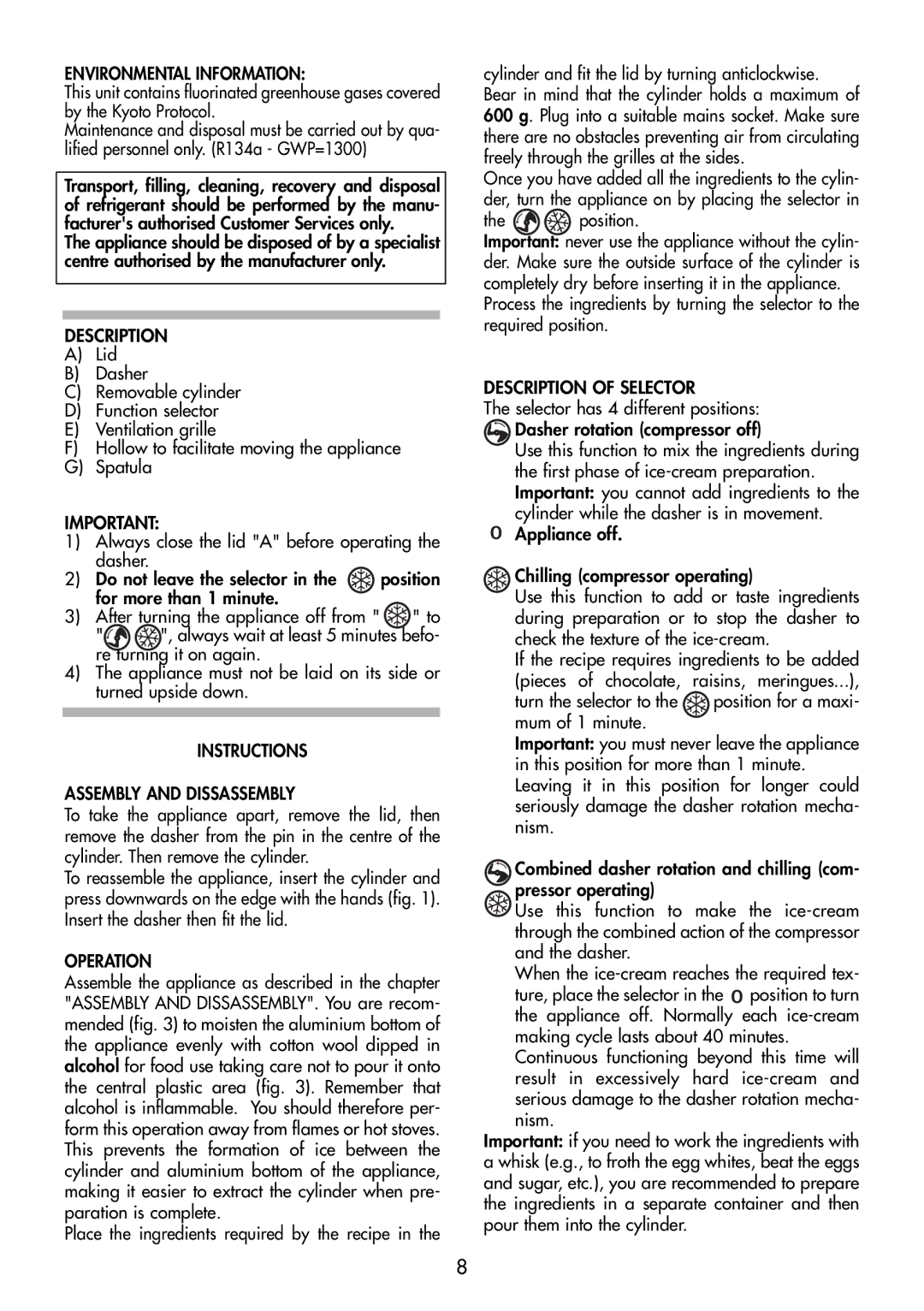
ENVIRONMENTAL INFORMATION:
This unit contains fluorinated greenhouse gases covered by the Kyoto Protocol.
Maintenance and disposal must be carried out by qua- lified personnel only. (R134a - GWP=1300)
Transport, filling, cleaning, recovery and disposal of refrigerant should be performed by the manu- facturer's authorised Customer Services only.
The appliance should be disposed of by a specialist centre authorised by the manufacturer only.
DESCRIPTION
A)Lid
B)Dasher
C)Removable cylinder
D)Function selector
E)Ventilation grille
F)Hollow to facilitate moving the appliance
G)Spatula
IMPORTANT:
1)Always close the lid "A" before operating the dasher.
2) | Do not leave the selector in the | position | |
| for more than 1 minute. |
| |
3) | After turning the appliance off from " | " to | |
| " | ", always wait at least 5 minutes befo- | |
re turning it on again.
4)The appliance must not be laid on its side or turned upside down.
INSTRUCTIONS
ASSEMBLY AND DISSASSEMBLY
To take the appliance apart, remove the lid, then remove the dasher from the pin in the centre of the cylinder. Then remove the cylinder.
To reassemble the appliance, insert the cylinder and press downwards on the edge with the hands (fig. 1). Insert the dasher then fit the lid.
OPERATION
Assemble the appliance as described in the chapter "ASSEMBLY AND DISSASSEMBLY". You are recom- mended (fig. 3) to moisten the aluminium bottom of the appliance evenly with cotton wool dipped in alcohol for food use taking care not to pour it onto the central plastic area (fig. 3). Remember that alcohol is inflammable. You should therefore per- form this operation away from flames or hot stoves. This prevents the formation of ice between the cylinder and aluminium bottom of the appliance, making it easier to extract the cylinder when pre- paration is complete.
Place the ingredients required by the recipe in the
cylinder and fit the lid by turning anticlockwise. Bear in mind that the cylinder holds a maximum of 600 g. Plug into a suitable mains socket. Make sure there are no obstacles preventing air from circulating freely through the grilles at the sides.
Once you have added all the ingredients to the cylin- der, turn the appliance on by placing the selector in
the  position.
position.
Important: never use the appliance without the cylin- der. Make sure the outside surface of the cylinder is completely dry before inserting it in the appliance.
Process the ingredients by turning the selector to the required position.
DESCRIPTION OF SELECTOR
The selector has 4 different positions:
Dasher rotation (compressor off)
Use this function to mix the ingredients during the first phase of
Appliance off.
Chilling (compressor operating)
Use this function to add or taste ingredients during preparation or to stop the dasher to check the texture of the
If the recipe requires ingredients to be added (pieces of chocolate, raisins, meringues...),
turn the selector to the position for a maxi- mum of 1 minute.
Important: you must never leave the appliance in this position for more than 1 minute. Leaving it in this position for longer could seriously damage the dasher rotation mecha- nism.
![]() Combined dasher rotation and chilling (com- pressor operating)
Combined dasher rotation and chilling (com- pressor operating)
Use this function to make the
When the ![]() position to turn the appliance off. Normally each
position to turn the appliance off. Normally each
Continuous functioning beyond this time will result in excessively hard
Important: if you need to work the ingredients with a whisk (e.g., to froth the egg whites, beat the eggs and sugar, etc.), you are recommended to prepare the ingredients in a separate container and then pour them into the cylinder.
8
